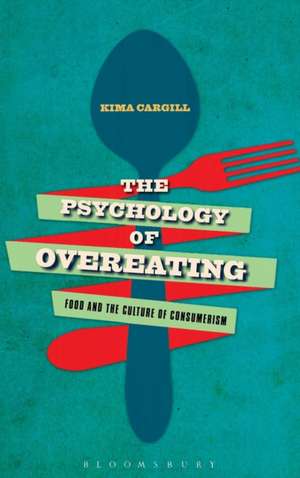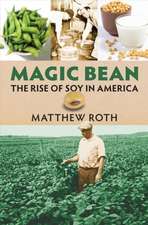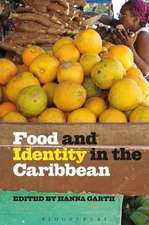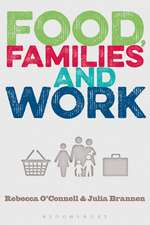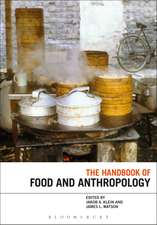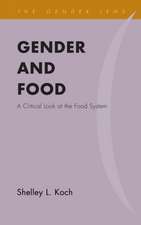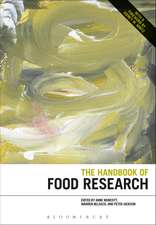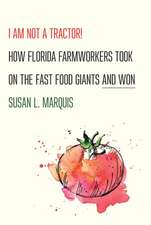The Psychology of Overeating: Food and the Culture of Consumerism
Autor Professor Kima Cargillen Limba Engleză Hardback – 21 oct 2015
| Toate formatele și edițiile | Preț | Express |
|---|---|---|
| Paperback (1) | 179.98 lei 3-5 săpt. | |
| Bloomsbury Publishing – 21 oct 2015 | 179.98 lei 3-5 săpt. | |
| Hardback (1) | 714.61 lei 6-8 săpt. | |
| Bloomsbury Publishing – 21 oct 2015 | 714.61 lei 6-8 săpt. |
Preț: 714.61 lei
Preț vechi: 915.38 lei
-22% Nou
Puncte Express: 1072
Preț estimativ în valută:
136.74€ • 142.77$ • 113.17£
136.74€ • 142.77$ • 113.17£
Carte tipărită la comandă
Livrare economică 05-19 aprilie
Preluare comenzi: 021 569.72.76
Specificații
ISBN-13: 9781472581082
ISBN-10: 1472581083
Pagini: 216
Ilustrații: 8 bw illus
Dimensiuni: 156 x 234 x 14 mm
Greutate: 0.48 kg
Editura: Bloomsbury Publishing
Colecția Bloomsbury Academic
Locul publicării:London, United Kingdom
ISBN-10: 1472581083
Pagini: 216
Ilustrații: 8 bw illus
Dimensiuni: 156 x 234 x 14 mm
Greutate: 0.48 kg
Editura: Bloomsbury Publishing
Colecția Bloomsbury Academic
Locul publicării:London, United Kingdom
Caracteristici
Includes engaging clinical case studies from the author's own practice which situate everyday struggles with food within the broader cultural context of consumption
Notă biografică
Kima Cargill is an Associate Professor of Psychology in the Interdisciplinary Arts and Sciences Program at the University of Washington, Tacoma, USA.
Cuprins
1. Introduction2. The Rise of Consumer Culture3. The Psychological Effects of Consumer Culture4. Food, Money and Consumer Culture5. How the Food Industry Uses Psychology to Trick Us (and Why We Let Them)6. Sugar and Sweet7. Hyperpalatable Foods, Hormones and Addiction8. Binge Eating Disorder, the DSM, and Consumer Culture9. The Bedfellows of Consumer Culture: Big Food and Big Pharma10. The Regulation of Well-Being: FDA and the Nanny State11. ConclusionBibliographyIndex
Recenzii
America has a problem. As the latest data released last week by the Centers For Disease Control's National Center for Health Statistics confirmed, far too many of us are overweight. The number of obese Americans is actually rising at a rate not seen in over a decade, putting them at increased risk of a number of serious health issues including Type 2 diabetes and heart disease . Cargill relies on a wide spectrum of empirical research and her own work with clients to argue that overeating should not be seen as a sign of an individual's lack of willpower but, instead, as part of a much larger conversation on how food is aggressively and dishonestly marketed to consumers.
Using a mix of case studies, literature review and own experience and insight, this book strikes a careful balance between scientific theory and popular science. It is incredibly easy to read and understand without being superficial. The list of references at the back, while not surprising, was unusual for a book that's so accessible. This isn't an academic textbook aimed at researchers or theorists, it's a day to day guide to spotting the many pitfalls of the world we now live in, so you can step over the cracks forged by the food industry, big pharma and many others rather than be sucked in.
This a fascinating and important book.
Cargill posits that our consumer culture is at least partly to blame for our bloated waistlines. Likening 'Big Food' to 'Big Pharma,' the author faults food and beverage companies for manufacturing desire in human beings, who may be conditioned by evolution to gorge on nutrient sources as they become available . the author makes an interesting argument, implicating the contributions of corporate America and a society bent on consumption and materialism in driving the problem ever faster.
Psychologist Kima Cargill takes a tough, critical look at today's consumerist culture from the perspective of research as well as of observations drawn from her clinical experience with patients struggling with weight issues. To stop overeating in today's food environment means finding effective ways to counter the many moral, political, economic, and social imperatives to consume. The ideas in this book should inspire readers to think of obesity in an entirely different way-more as the result of a consumerist society than of individual weakness.
Kima Cargill's work is at the forefront of the intersection of clinical psychology and food studies. She is among the very few academics who understands modern eating disorders within the broader perspective of food culture. This book promises to bridge the enormous gulf between theory and practice and will be essential reading for working psychologists and students of food in America.
An important contribution to food studies scholarship, as no other work covers quite the same territory. Cargill's discussion connecting consumerism in its broadest sense to food consumption is a unique, impressive contribution to contemporary discussions of food and health in the United States.
The psychology of overeating, Cargill argues, is similar to the psychology of overbuying. People who live in consumerist cultures like ours identify themselves by what they consume, not by what they produce . Too much stuff? Buy stuff to organize your stuff. Eat too much? Buy special diet food. Feel anxious? Buy Paxil. Too expensive? Buy a generic version that's probably made by the same drug company and that only has to prove it fights your anxiety better than a sugar pill . Cargill drops a glut of Holy Shit That's Crazy facts and arguments from all over the academic world in order to illuminate and back up her comparative theory.
Situating her exploration of overeating in a broader discussion of consumption and materialism, Cargill (clinical psychology, Univ. of Washington, Tacoma) offers a unique perspective informed not only by her background as a clinical psychologist but also by her interest in food studies. She draws from multiple disciplines (sociology, nutrition, history, political science) and works through concepts with palpable pleasure. The study is deliberate and thoughtful, and the author takes the time for relevant explanations [inviting] others to explore alternative models of resistance. Summing Up: Highly recommended. Lower-division undergraduates and above; general readers.
Using a mix of case studies, literature review and own experience and insight, this book strikes a careful balance between scientific theory and popular science. It is incredibly easy to read and understand without being superficial. The list of references at the back, while not surprising, was unusual for a book that's so accessible. This isn't an academic textbook aimed at researchers or theorists, it's a day to day guide to spotting the many pitfalls of the world we now live in, so you can step over the cracks forged by the food industry, big pharma and many others rather than be sucked in.
This a fascinating and important book.
Cargill posits that our consumer culture is at least partly to blame for our bloated waistlines. Likening 'Big Food' to 'Big Pharma,' the author faults food and beverage companies for manufacturing desire in human beings, who may be conditioned by evolution to gorge on nutrient sources as they become available . the author makes an interesting argument, implicating the contributions of corporate America and a society bent on consumption and materialism in driving the problem ever faster.
Psychologist Kima Cargill takes a tough, critical look at today's consumerist culture from the perspective of research as well as of observations drawn from her clinical experience with patients struggling with weight issues. To stop overeating in today's food environment means finding effective ways to counter the many moral, political, economic, and social imperatives to consume. The ideas in this book should inspire readers to think of obesity in an entirely different way-more as the result of a consumerist society than of individual weakness.
Kima Cargill's work is at the forefront of the intersection of clinical psychology and food studies. She is among the very few academics who understands modern eating disorders within the broader perspective of food culture. This book promises to bridge the enormous gulf between theory and practice and will be essential reading for working psychologists and students of food in America.
An important contribution to food studies scholarship, as no other work covers quite the same territory. Cargill's discussion connecting consumerism in its broadest sense to food consumption is a unique, impressive contribution to contemporary discussions of food and health in the United States.
The psychology of overeating, Cargill argues, is similar to the psychology of overbuying. People who live in consumerist cultures like ours identify themselves by what they consume, not by what they produce . Too much stuff? Buy stuff to organize your stuff. Eat too much? Buy special diet food. Feel anxious? Buy Paxil. Too expensive? Buy a generic version that's probably made by the same drug company and that only has to prove it fights your anxiety better than a sugar pill . Cargill drops a glut of Holy Shit That's Crazy facts and arguments from all over the academic world in order to illuminate and back up her comparative theory.
Situating her exploration of overeating in a broader discussion of consumption and materialism, Cargill (clinical psychology, Univ. of Washington, Tacoma) offers a unique perspective informed not only by her background as a clinical psychologist but also by her interest in food studies. She draws from multiple disciplines (sociology, nutrition, history, political science) and works through concepts with palpable pleasure. The study is deliberate and thoughtful, and the author takes the time for relevant explanations [inviting] others to explore alternative models of resistance. Summing Up: Highly recommended. Lower-division undergraduates and above; general readers.
